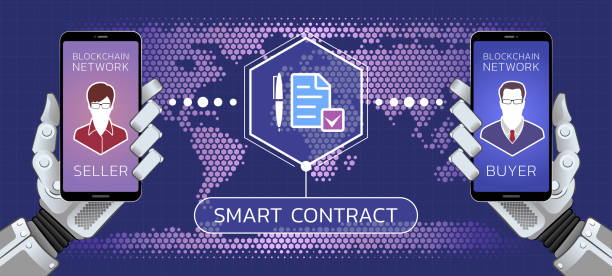
Smart contracts, like any other contract, spell out the parameters of a business or agreement. On the other hand, smart contracts are defined and executed as code running on a blockchain rather than on paper on a lawyer’s desk, making them “smart.” Smart contracts build on Bitcoin’s core concept of sending and receiving money without needing a “trusted intermediary” like a bank in the middle, allowing for the secure automation and decentralization of practically any type of deal or transaction, no matter how complicated. They also provide security, stability, and borderless accessibility because they run on a blockchain like Ethereum.
Smart contracts are an important part of the blockchain technology introduction. It aids in making transactions safer and more secure, as well as ensuring that they go smoothly. Not only that, but it also makes other components, such as apps that run on these platforms, more accessible.
What is a Smart Contract?
Lines of code directly put the conditions of the buyer-seller agreement into a self-executing contract known as a smart contract. A decentralized blockchain network disseminates the code, along with the agreements it contains. Transactions are trackable and irreversible, and the programming regulates their execution.
Smart contracts eliminate the need for a central authority, legal system, or external enforcement mechanism to carry out trustworthy transactions and agreements between distant, anonymous participants.
While blockchain technology is most known for being the foundation for bitcoin, it has progressed much beyond that. Smart contracts allow developers to construct apps that take advantage of blockchain security, stability, and accessibility while enabling advanced peer-to-peer functionality — everything from loans and insurance to logistics and gaming.
Despite the term, smart contracts are not legally binding contracts. They primarily execute business logic programmatically to perform a range of operations, processes, or transactions programmed into them, responding to a specific set of situations. Parties must take legal actions to relate the execution to legally enforceable agreements.
History of the Smart Contract
Smart contracts were initially proposed in 1994 by Nick Szabo, an American computer scientist who established a virtual currency called “Bit Gold” in 1998, fully 10 years before the birth of bitcoin. In fact, Szabo is widely suspected to be the genuine Satoshi Nakamoto, the anonymous inventor of bitcoin, which he has denied.
Szabo defined smart contracts as computerised transaction protocols that execute the terms of a contract. He sought to extend the capability of electronic transaction systems, such as POS (point of sale), to the digital arena.
In his work, Szabo also proposed the execution of a contract for synthetic assets, such as derivatives and bonds. Szabo wrote: “These new assets are generated by mixing securities (such as bonds) and derivatives (options and futures) in a broad variety of ways. Very complex term structures for payments can now be integrated into standardised contracts and exchanged with low transaction costs, due to computerised analysis of these complex term structures.”
Many of Szabo’s forecasts in the paper came true in ways preceding blockchain technology. Computer networks now primarily conduct derivatives trading using complicated term structures, for example.
How Smart Contracts Work
Smart contracts encode basic “if/when…then…” phrases into code on a blockchain, thus working. A network of computers executes the activities when it meets and validates preset circumstances. These actions could include releasing payments to the right parties, registering a vehicle, providing alerts, or issuing a ticket. The transaction finishes and updates the blockchain, preventing any modifications, and granting access to the outcomes only to authorized parties.
The participants believe that including as many specifications as needed within a smart contract will ensure the correct execution of the task. Participants must identify how transactions and associated data represent on the blockchain, agree on the “if/when…then…” rules that govern those transactions, explore any possible exceptions, and design a framework for resolving disputes in order to set the conditions.
A developer can develop the smart contract, although increasingly, firms that use blockchain for business provide templates, web interfaces, and other online tools to facilitate building smart contracts.
Benefits of Smart Contracts
Speed, efficiency and accuracy
Once the criteria meet, execute the contract immediately. Since smart contracts are digital and automatic, there’s no paperwork to complete and also no time spent correcting errors that typically occur from manually filling in documentation.
Security
The encoding of blockchain transaction records makes them incredibly hard to hack. Furthermore, hackers would need to manipulate the entire chain of consecutive records on a distributed ledger since each record is tied to the past, in order to change a single record.
Trust and transparency
Participants actively share encoded records of operations, eliminating the need to question whether they have manipulated data for personal profit since there is no engaged third party.
Savings
Smart contracts reduce the need for middlemen to manage transactions and, by extension, their accompanying time delays and fees.
Smart Contract Use Cases
Finance
With the greater transparency offered by smart contracts (combined with 24/7 functioning, and reduced costs), DApps have the ability to lower the barriers to entry into the financial services arena for people all over the world.
DeFi projects have already garnered billions of U.S. dollars in value and seek to continue this trend as more and more individuals get familiar with the unique value propositions of the sector. Users can engage in this new generation of financial services without the requirement for centralised custody or fees from middlemen. Despite being only a few years old, the DeFi sector has already started to make its presence felt in the financial industry due to the numerous creative DApps offering value and utility to consumers.
NFTs and Gaming
Developers produce and release games, and gamers pay to play and engage with such games. This creates a one-directional flow of value where users spend money to obtain access to in-game materials and gameplay options. In contrast, blockchain technology in gaming can enable users to capture the usefulness and value of in-game purchases and asset acquisitions more effectively.
Blockchain technology in gaming is often driven by non-fungible tokens (NFTs) — unique digital assets that represent in-game content. NFTs rely on smart contracts. These tokens are unique, scarce, and indivisible, while the blockchain networks that support NFTs facilitate player ownership, proving scarcity, interoperability, and immutability. Together, these qualities of blockchain in gaming have the potential to drive widespread adoption and a more equitable value model.
Legal Industry
Perhaps one of the most interesting real-world smart contract use cases is their potential to function as legally enforceable contracts — the kind that informs most of today’s commercial agreements. Technology has been pushing innovation in the legal business, most recently with the development of e-signatures for binding legal agreements. Smart contracts offer another new development in this field, and may soon be an alternative for parties to legal agreements, potentially cutting the costs paid by utilising lawyers and other middlemen.
The widespread usage of bespoke smart contracts for many types of transactions that can cut prices and boost transaction speeds may be closer than you think.
Real Estate
Through tokenization, smart contracts are promoting the fractional ownership of assets and therefore decreasing the barrier to entry for investment for many by mixing blockchain and real estate transactions. In particular, there have been a number of successful initiatives in tokenizing real estate assets, including via platforms like RealT and SolidBlock that integrate blockchain with real estate. Smart contract technology can potentially revamp the documentation and transaction processes by utilizing blockchain in real estate deals.
Undoubtedly, anyone who purchases a home or other property is aware of the possibility of hidden expenditures associated with closing fees, title transfers, and broker fees. Automatically executing smart contracts that function free of intermediaries could lower or even avoid these costs.
Some experts even believe that smart contracts can benefit parties by streamlining rental agreements and complex credit or mortgage arrangements, as well as warranties and insurance. By implementing smart contracts and blockchain in real estate, the necessity for legal counsel or other advisory services becomes less necessary, potentially decreasing costs across the board.
Before You Go…
Hey, thank you for reading this blog to the end. I hope it was helpful. Let me tell you a little bit about Nicholas Idoko Technologies. We help businesses and companies build an online presence by developing web, mobile, desktop, and blockchain applications.
We also help aspiring software developers and programmers learn the skills they need to have a successful career. Take your first step to becoming a programming boss by joining our Learn To Code academy today!
Be sure to contact us if you need more information or have any questions! We are readily available.
[E-Books for Sale]
1,500 AI Applications for Next-Level Growth: Unleash the Potential for Wealth and Innovation
$5.38 • 1,500 AI Applications • 228 pages
Are you ready to tap into the power of Artificial Intelligence without the tech jargon and endless guesswork? This definitive e-book unlocks 1,500 real-world AI strategies that can help you.
See All 1,500 AI Applications of this E-Book
750 Lucrative Business Ideas: Your Ultimate Guide to Thriving in the U.S. Market
Put Your Tech Company on the Map!
Get featured on Nicholas Idoko’s Blog for just $50. Showcase your business, boost credibility, and reach a growing audience eager for tech solutions.
Publish Now$49 • 750 Business Ideas • 109 pages
Unlock 750 profitable business ideas to transform your future. Discover the ultimate guide for aspiring entrepreneurs today!
See All 750 Business Ideas of this E-Book
500 Cutting-Edge Tech Startup Ideas for 2024 & 2025: Innovate, Create, Dominate
$19.99 • 500 Tech Startup Ideas • 62 pages
You will get inspired with 500 innovative tech startup ideas for 2024 and 2025, complete with concise descriptions to help you kickstart your entrepreneurial journey in AI, Blockchain, IoT, Fintech, and AR/VR.
We Design & Develop Websites, Android & iOS Apps
Looking to transform your digital presence? We specialize in creating stunning websites and powerful mobile apps for Android and iOS. Let us bring your vision to life with innovative, tailored solutions!
Get Started Today



